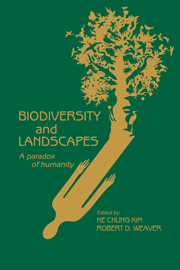Book contents
- Frontmatter
- Contents
- Contributors
- Preface
- Part I Introduction
- Part II Human values and biodiversity
- Part III Human processes and biodiversity
- Part IV Management of biodiversity and landscapes
- Part V Socioeconomics of biodiversity
- 13 Economic valuation of biodiversity
- 14 Thinking about the value of biodiversity
- 15 Lessons from the aging Amazon frontier: opportunities for genuine development
- Part VI Strategies for biodiversity conservation
- Part VII Biodiversity and landscapes: postscript
- Index
14 - Thinking about the value of biodiversity
Published online by Cambridge University Press: 04 August 2010
- Frontmatter
- Contents
- Contributors
- Preface
- Part I Introduction
- Part II Human values and biodiversity
- Part III Human processes and biodiversity
- Part IV Management of biodiversity and landscapes
- Part V Socioeconomics of biodiversity
- 13 Economic valuation of biodiversity
- 14 Thinking about the value of biodiversity
- 15 Lessons from the aging Amazon frontier: opportunities for genuine development
- Part VI Strategies for biodiversity conservation
- Part VII Biodiversity and landscapes: postscript
- Index
Summary
The evidence seems strong that a mass extinction of species is underway and, this time, humankind bears most of the blame. The problem seems to be that the scale of human activity on the planet has grown so large that it is imposing unprecedented stress on the biota. The planet is supporting many more people than ever before, and the lifestyle that the affluent minority enjoys and most everyone else covets is increasingly intrusive on natural systems.
The interests of humanity and the rest of the biota are not in pure opposition. In some cases, the immediate threat to biodiversity comes more from simple human carelessness than from pressing human needs. Let me offer two kinds of examples. First, Bishop (1980) documents several cases in which the future of threatened species could be secured at quite small expense. In such cases, it does not require generous assumptions about preservation benefits to justify making the effort. Second, economists (e.g., Southgate, 1988) have argued persuasively that many deforestation and land-settlement movements around the Third World – major threats to biodiversity – are motivated by inefficient subsidies and incentives. Respect for traditional concepts of efficiency would be sufficient to rein in these threats; enlightened respect for biodiversity would be laudable but not strictly necessary. In both these examples, humans could accommodate the needs of biodiversity at very little real cost, if they would simply be a little more careful.
- Type
- Chapter
- Information
- Biodiversity and LandscapesA Paradox of Humanity, pp. 271 - 286Publisher: Cambridge University PressPrint publication year: 1994
- 4
- Cited by



